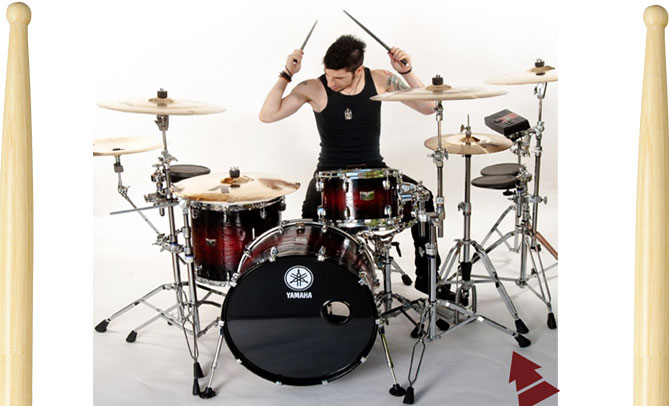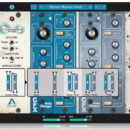By Nick Mason
So you’ve had trouble finding and keeping a good drummer for your band? You’re not alone. As a drummer myself, I understand that this can be a difficult task. It would seem that the few good drummers out there are always juggling projects and jumping from band to band. This can cause the perception that drummers are all “musical whores,” “flaky,” or just straight-up egotistical pains in the ass. Well, in the following tips I’m here to shed some light on the subject, give you the kind of insight that will help you to find a great time-keeper and keep him for as long as it takes.
Be Prepared. I never walk into an audition or rehearsal without knowing the material inside and out, and I expect the same work ethic from the people I audition for. So be sure you have all the necessary gear for the situation and then some! Time after time I have to loan a DI box to a bassist or an extra cable to a guitarist who didn’t bring enough.
Decide Who’s A Band Member. Almost every single day I read an ad online or get contacted by a band that wants a drummer who can “copy the existing drum parts to my songs,” and perform everything to exact specification. That’s fine––if your drummer is being paid. But if you’re not looking for a hired gun, or not willing to compensate your musicians, then everyone in the band needs equal rights. Everything from writing and performing the music, to the business decisions of the group, should be split equally; it can’t just be “your band.” If you want it to be “your band,” hire musicians to do the job your way.
Be Professional. If you’re hiring a pro-fessional drummer, it is important to be professional yourself. Show up early to every rehearsal, session or gig. Be polite and communicate clearly to not only your drummer and other band members, but to sound engineers, promoters, club owners, managers. Most importantly, drop the ego. You are not as important as you think.
Let ‘Em Juggle. Why is it that most professional drummers juggle multiple projects at a time? The first reason is that, believe it or not, drummers are artists too. Being able to physically create sound and rhythm is a magical thing. Not all artists can satisfy themselves with one canvas and are happy being able to play Death Metal Monday night and Latin-Jazz Tuesday. It doesn’t mean band “A” is more or less important than band “B.” Reason 2 is that the drummer is often the lowest paid member of a group. Singer-songwriters who hire a musician don’t often share publishing rights, and are in a higher pay scale than someone who comes into the situation after it’s already functioning. So, in order to keep a roof over their head, many musicians, drummers included, have to take on more than one job. Don’t get bent out of shape thinking your drummer is cheating on your band.
Don’t Be A Hard-Ass. There are a lot of bandleaders out there who want everything to be perfect every single time right from the word “go.” In a perfect world, this would be wonderful, but that’s not the case. Drummers are not machines, we are humans, and from time to time we make mistakes. Giving a drummer a day-and-a-half to learn 12 songs and then wondering why it’s not 100 percent perfect is unreasonable. This kind of behavior can often lead to you going through numerous drummers, and can give you the reputation of being “Hard to work with.”
Expect Your Drummer to Provide the Human Touch. Nowadays nine out of 10 pop recordings are done with programmed drums, especially when it comes to independent artists. Not every sound or pattern can always be duplicated by real or acoustic drums. An artist who only relies on “feel” or “sound” will probably think something is off when playing with a live drummer as opposed to a programmed track. It doesn’t mean the drummer did anything wrong; it’s just that the artist probably isn’t used to hearing a loud acoustic drum versus an 808 sample, and doesn’t know it. It pays to learn how a live band really works, sounds, smells and feels.
Talk the Drummer Talk. If you can only tell a drummer to “hit that thing here” you’re not communicating correctly. Don’t be one of those musicians who has little to no knowledge about the other instruments around you––take some time and learn. More than once I have been told to “play more snare drum in this part” when snare drum is not at all what they wanted to hear. (Note to drummers: you should do the same. It’s nice to be able to tell the guitarist “palm mute the A chord” and watch their jaw drop at the fact you know about something you don’t hit with a stick.)
Communicate Openly. Being able to communicate within a band is key. Don’t let the threat of confrontation silence you until you send a cowardly email or text relieving someone of his position. If you find yourself unhappy with part of a song, or something a player is doing, speak up! I have seen many people lose jobs via a phone call 30 minutes after a re-hearsal because someone in the band didn’t speak up. If you can say, “Hey, change this part” or “fix that” right away, I’m sure you will find most drummers to be accommodating, and even willing to fix the issue. You’re only being selfish and egotistical if you don’t give someone the chance to fix a problem.
Appreciate Drumming Technique. It takes a great amount of dexterity to play most instruments. With vocalists, it’s about taking care of your voice and using proper vocal techniques. Brass and wind players have to deal with both. With drummers it’s MUCH more than just bashing away like a caveman. In fact, being a drummer is comparable to being a professional athlete, as the average drummer loses between 400 and 600 calories per hour. Drums and cymbals are typically not tuned to specific keys. There are no sharps, flats or chords in most drum music. BUT, there is a massive amount of technique, not to mention the coordination of having four limbs doing separate rhythms at the same time. Point is, it is much harder to be a drummer than most people think. Keep that in mind the next time you ask your drummer to play a syncopated triplet pattern over a 9/14 Left-foot Clave rhythm, open hi hats on the Ands, and accenting the E of beat One on every Third bar.
Feel the Drummer’s Dedication. Playing music is expensive; playing music is hard work. A dozen guitar picks cost $1.95 and a single pair of drumsticks, which will break after an hour, cost $7. A guitarist has a guitar, cables and an amp. A drummer has five or more drums, four or more cymbals, and hardware to accommodate all of it. Not only can drumming be more expensive, but it can also be a much larger hassle than any other instrument. I haven’t seen too many flautist’s who have to show up over an hour early to every gig to put their instrument together. Broken snare head, $15, popped high E string, $1.25. Being aware of what the drummer, or any musician for that matter, has to go through just to perform can change an attitude. Remember, he is there because he loves to play.
miniBIO: Nick Mason is a professional session and touring drummer, based out of Los Angeles, CA. He has been seen on countless stages across North America, and can be heard on dozens of studio recordings. As an independent artist, Mason performs with a large variety of musical acts on a daily basis and also conducts private percussion lessons. This summer you can see him as a member of Street Drum Corps, during their theme park residency. For further information check out http://nickmason.org.













